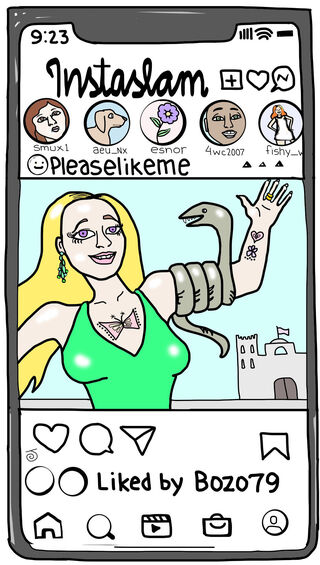Media
18 Reasons Why Social Media Makes Us Hate Ourselves
Self-esteem-crushing protocols are built into its design.
Posted November 10, 2021 Reviewed by Gary Drevitch
Key points
- As more realms of human interaction are shaped by and start to resemble social media, its popularity-based protocols punish the vulnerable.
- In a system where status derives from numbers-based popularity, it's all too easy to feel unliked and unseen.
- Monitoring our social-media notifications is often painful, yet we invite this pain repeatedly each day.

Social media is designed to make us hate ourselves.
It's engineered to scare and shame us — mainly by being a nonstop global gauge broadcasting our aloneness and unpopularity for all to see. Even its benefits — so far-reaching! so fast! — fuel its capacity for harm. Now shaping nearly every realm of human interaction, social media fuels our insecurities in these and other ways:
- It is a contest between us and everyone, sparking our urge to view fellow humans as competitors and every word/act/interchange as an audition or race we might lose.
- It's science, so it must be true. Pre-social media, we wondered vaguely how our hair looked or our presentations went. Now those answers are calculated technologically as numbers glaring out from screens.
- The lives of others seem so sexy, fun, and lush compared to ours as we naively observe manufactured simulacra of such lives, mistaking them for true.
- Our skills seem worthless. Lacking skills such as sociability, makeup, or art which make others "good at" and/or are easily displayed on social media makes us deride whatever skills we have instead. You're a statistician or master pipefitter? So what?!
- We're being watched and judged. Humans have always (sensibly) feared being monitored and scanned. But social media exhorts us to expose ourselves and love being surveilled.
- On virtual stages, we pose. Performativity turns every word we type and every picture we post into a recital, everyplace we are into a stage — and thus every reality less real.
- The more our sense of self depends on others, the less "ours" it is. Following influencers, fawning and urgently seeking applause divides us from our inner selves.
- Cheating and deception are normalized when platforms offer beauty filters with which users — including 90% of women, one study reveals — "improve" their looks, then declare: This is me.
- We feel so ugly when comparing our unfiltered looks to those of users whom we don't realize use filters — and when we feel forced to filter our own "unpresentable" selves.
- All boundaries are broken. Aspects of us that once would have stayed private, social media compels us to reveal — because it's edgy, might attract emojis, and we're among "friends."
- It makes us do things that make us dislike ourselves, such as boast, lie, argue, and self-obsess, as well as mocking others for their looks, views, or intelligence — even just secretly.
- We constantly fear punishment. For those of us who live in (mainly traumagenic) fear of making others sad or mad, social media is a terrifying gauntlet, a spotlit interrogation room.
- Chronic attention-seeking redefines the meaning of attention. Even cruel comments prove that we merit discussion, even passion, which makes some of us start craving and provoking more.
- This is a bullies' playground. Anyone out there can employ social media to scare us, scorn us, stoke our insecurities, and slash our trust — in humankind, ourselves, and truth.
- Does no one care what I like, make or do? Pouring time, talent, energy, and creativity into content that gains scant or no response can make us feel invisible, ignored, absurd, or ashamed.
- Self-confidence and self-compassion seem ridiculous compared to the opinions of three million strangers half a world away.
- We hate ourselves for hating social media. We hoped to have fun, find friends, share stories, gain fanbases, and further our careers. Who but a loser could dislike something so popular?
- We suffer, but can't quit, fearing that departing social media would cut us off from family, friends, society, and reality — and define us as failures or non-persons or freaks.
Not everyone experiences all of these crises which are intrinsic to social media—a rapid mathematics of technology and personality, secrets and lies, surveillance and desire—and not everyone gets hurt, but for the vulnerable and the permeable, it's not a safe place.


